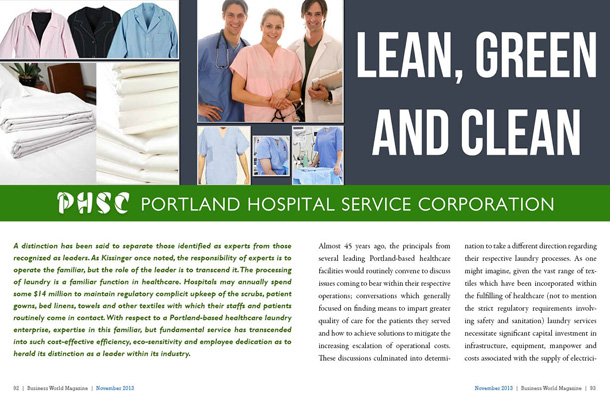
Lean, Green and Clean
A distinction has been said to separate those identified as experts from those recognized as leaders. As Kissinger once noted, the responsibility of experts is to operate the familiar, but the role of the leader is to transcend it. The processing of laundry is a familiar function in healthcare. Hospitals may annually spend some $14 million to maintain regulatory complicit upkeep of the scrubs, patient gowns, bed linens, towels and other textiles with which their staffs and patients routinely come in contact. With respect to a Portland-based healthcare laundry enterprise, expertise in this familiar, but fundamental service has transcended into such cost-effective efficiency, eco-sensitivity and employee dedication as to herald its distinction as a leader within its industry.
Almost 45 years ago, the principals from several leading Portland-based healthcare facilities would routinely convene to discuss issues coming to bear within their respective operations; conversations which generally focused on finding means to impart greater quality of care for the patients they served and how to achieve solutions to mitigate the increasing escalation of operational costs. These discussions culminated into determination to take a different direction regarding their respective laundry processes. As one might imagine, given the vast range of textiles which have been incorporated within the fulfilling of healthcare (not to mention the strict regulatory requirements involving safety and sanitation) laundry services necessitate significant capital investment in infrastructure, equipment, manpower and costs associated with the supply of electricity, natural gas and water – it’s a lot to take-on for any one hospital. During this time, these healthcare leaders realized that by joining forces with respect to their laundry operations, they would not only benefit from saving on costs, but would also be empowered to better focus on their core competencies of tending to the health and wellness needs of their patients. And so it was, in 1970, principals from five local area hospitals established a not-for-profit joint-venture known today as Portland Hospital Service Corporation (PHSC). This enterprise has since emerged as one of the most dynamic operations in the healthcare laundry industry, annually processing more than 24 million pounds of textiles vital to the needs of 15 hospitals within the PHSC owner heath care systems of Kaiser Permanete Northwest, Legacy Health System and Providence Health System, as well as hundreds of medical and dental clinics. In addition to being the largest healthcare textile processor in its region, PHSC is recognized as an industry model of best practices in operational efficiency, safety and environmental stewardship, all are byproducts from the fulfilling of a mission that mandates what Chief Operating Officer Deborah Lark defines as “dedication to excellence in product, service and fiscal responsibility.â€
Accredited Excellence
Though Lark is exceptionally quick to credit PHSC’s success to the teamwork and dedication of the 140 people that work here, while also recognizing what she calls the vision and support provided by an engaged board of directors, there can simply be no overstating of the beneficial impact Lark has made in Portland, or for that matter, the healthcare laundry industry. To put that in perspective requires some insight on her background. Long before she was tasked with operational oversight of PHSC, Lark fulfilled other essential roles. She was among the first of female inspectors to serve with the National Council on Compensation Insurance, a role that routinely found her auditing businesses to determine if they had been properly qualified based on the codes congruent with the worker’s comp program. She has also served as an educator, fulfilled treasury services for healthcare systems, and concedes that in her youth, she flipped a lot of hamburgers too. Lark says the totality of these experiences taught her to adapt to a variety of management structures and operational systems, but it also fueled a certain yearning. “I always said that if I had an opportunity to run a business, I would try to do it in a way that the employees felt valued … a culture that understands the importance of their work and why their service matters.â€
This is exactly what Lark has imparted to PHSC, yet the fact remains, she is doing the same on a much larger scale, and to be sure, it enables influence throughout the industry. Lark also serves among the board of directors for the Healthcare Laundry Accreditation Council, an esteemed, industry leading, independent trade association who devised the rigorous standards and operational protocols, as well as the actual accreditation system, widely sought by operators today for it helps distinguish those who are adhering to best practices in the healthcare laundry industry. What’s more, for years Lark has been an engaged member of the International Association for Healthcare Textile Management (IAHTM). The mission of IAHTM is to promote executive-focused education that fosters excellence in industry. With its members servicing more than 3,000 healthcare facilities throughout North America, annually processing more than 700 million pounds of textiles, IAHTM is the world’s largest healthcare central laundry organization. PHSC’s Deborah Lark just so happens to also be the newly appointed president of IAHTM. In Portland, Lark has imparted the spectrum of operational advantages available through HLAC and IAHTM. PHSC has undertaken the extensive auditing and inspections of its operational platforms, worker training, safety standards and record keeping necessary to achieve HLAC accreditation. Through her affiliation with IAHTM, Lark has means to readily access an international composite of healthcare laundry professionals such that if a question should arise, or some issue should present itself, she can secure advice to report back to the healthcare professionals PHSC serves. She calls this “an invaluable resource for laundry executives throughout the world.â€
 Eco-Sensitive Success
While PHSC may directly serve healthcare operations throughout Portland, the fulfilling of that work has fostered collaboration with some of North America’s leading manufacturers whose products and services are essential to everyone in this industry. This has led to not only operational benefits, but benefits for the environment in the Pacific Northwest. For example, when PHSC’s current facility was being designed more than ten years, they worked closely with equipment manufacturers to arrange the layout so that it was more efficient in use of natural resources. Collaborating with a manufacturer known as Lavatec, PHSC deploys a continuous batch washing system that allows for the reuse of water, an engineering innovation that allowed PHSC to reduce its water usage by 54 percent. Today, PHSC continues to collaborate with manufacturers including but not limited to Jensen USA and Chicago Dryer to implement high production methodologies and improve throughput.
PHSC also relies heavily on automation and software technology. In the case involving collaboration with Spindle, an industry leading provider of customized solutions to monitor and measure all manner of performance processes which occur in the running of a plant, PHSC achieved means to not only increase productivity and mitigate inefficiencies, but significantly reduce its consumption of electricity. Other strategies involved the retrofitting of lighting systems and securing of other energy-efficient equipment. PHSC has also worked closely with organizations such as Oregon Energy Trust to educate workers on how to reduce energy consumption within the plant, then took an additional step to help them understand what they can do to reduce their energy use at home.
More energy efficiencies have been realized through PHSC’s collaboration with linen suppliers, and Lark says the co-op works with the nation’s best, including Encompass Group, Medline Industries and Standard Textile. PHSC was among the very first healthcare laundries in the industry to serve as a proving ground of sorts for the developing, testing and integration of synthetic textiles. Now deployed throughout Portland, as well as the world, in the form of patient gowns, sheeting and other products, these synthetics require significantly less time to dry, an innovation which reduces consumption of natural gas.
On the chemical side, PHSC sources detergent from a vendor known as Mt. Hood Solutions, a Swisher Company who produces the only DFE Detergent (Designed for the Environment) which is the highest environmental rating by the EPA.
Lark says the collaboration with national suppliers has enabled PHSC to develop relationships with companies that are on the cutting edge of new products that help ensure operational efficiency, greater means of controlling costs, but more importantly, the ability to reduce impact on the environment which is of particular importance to all in the Pacific Northwest. As Lark says, “We do tend to be tree huggers in this region … we love our green forests and our rivers, lakes and ocean … so we try to have as minimal impact as possible. That’s a very high priority in Portland, but it’s also something we focus on in our company.â€
Collaborative Capability
The care to which PHSC collaborates with suppliers and industry professionals may only be exceeded by the culture of collaboration which enhances the experience of its workforce. It’s a culture that flourishes through active communication of how worker performance impacts patients, the hospitals serviced by PHSC as well as the workers themselves and their families. As Lark says, at some time sooner or later, some worker may find their parent, spouse or child being tended to in a hospital. Obviously, one would want to be sure their family member is being provided with quality service as well as clean, safe products. Lark says workers fully understand the role they fulfill in the continuum of healthcare, and this helps foster a particular commitment to quality and safety. What’s more, this is an environment where all feel encouraged to present their ideas or suggestions on solutions that might offer operational improvement. For instance, a labor management committee includes representatives from each production department as well as engineers and drivers that deliver goods. This team meets on a monthly basis to specifically discuss how to do things better. Lark says a safety committee also routinely meets to discuss strategies from a safety perspective. An organization newsletter, the sharing of customer praise and the consistent expression of gratitude (along with fair pay and benefits) helps keep staff aware of the value of their work. For all of the automation, technology and sophisticated engineering augmenting operations at PHSC, Lark affirms, “Our workers are our greatest asset … their dedication is what makes everything we do possible.â€
As for future possibilities, atypical of some laundry operations, Lark says PHSC has no interest in growth for the mere sake of growth; its only priority is expanding on the capacity to provide greater value to the healthcare systems to which its services are entrusted. Lark says one advance PHSC has made involves the production of reusable surgical packs. She says hospitals are moving away from the use of disposable products conventionally used in OR processes. Lark anticipates that segment of the laundry service to increasingly expand. Likewise, she says hospitals are now relying on more specialty items such as hover mats and slings that are used to help reposition patients. These are not common textile items, but PHSC is collaborating with manufacturers and suppliers to ensure these textiles can also be processed so that they are hygienically clean, consistent with the quality requirements for a healthcare laundry service. Lark says this work will also expand. For that matter, several of the local healthcare systems are also expanding through the opening of new hospitals or clinics, and PHSC has been designed to meet the laundry processing needs of these additions. “Our mission, and our goal, is to maintain capacity for our owner health systems, that’s really another aspect of the collaborative nature of our organization. Our intent was to focus on growing our services as they grew,†says Lark.
PHSC services are now positioned for further growth, but as this happens, Lark says it will continue to embrace collaborations that compel its constant improvement in operational productivity, innovation, product quality and environmental responsibility; values that have helped Portland Hospital Service Corporation become a model for service in Oregon and the world at large.
For more information, please visit their website at  Portland Hospital Service Corporation
Preferred Vendors of Choice:









